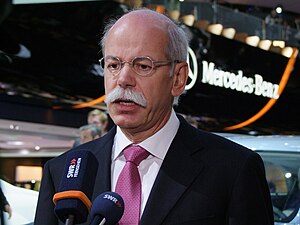Daimler has sunk billions in the hydrogen technology, which is still years away for any commercial applications in the car industry. It is very encouraging to see that the company is moving fast to buy time and technology in the EV space. Daimler has bought a stake in the Tesla Motors and has a J/V with BYD. Tesla now supplies battery systems for the Electric Smart. Daimler now takes Electric Cars seriously and has rolled out Mercedes E-Cell A-class at Paris Motor Show 2010. The very important confirmation of the future auto industry trend is the J/V of Daimler and Evonik for lithium ion battery production. It is important to remember that hydrogen technology will require lithium ion batteries on board of the vehicle as well as a fuel cell.
"We have put REE in the headline and only few months ago we would have to explain, what is it all about - now suddenly everybody is talking about REE and stocks involved in Rare Earths are all making new highs. It takes a crisis for us to realise that fundamentals are driving the real trends. Sudden realisation that China controls more than 90% of REE market and their reserves maybe will last only for another twenty years, created the catalyst in the market place.
What will it take to realise that we are running out of cheap oil? Another crisis?
We are talking here about the powerful mega trend Inflation multiplied by Peak Oil situation - we have to move and readjust our society. Our Energy diet is not sustainable any more. We are lucky in a sense that there is technology available to us to survive the Oil Shock if we will all move fast - Electric Cars. It is our Next Big Thing and at the heart of this disruptive technology lie strategic commodities: REE and Lithium."
Bloomberg:
Daimler Sees ‘Good Progress’ in Buffett-Backed Electric Car Pact
October 24, 2010, 12:01 PM EDT
Oct. 25 (Bloomberg) -- Daimler AG, the world’s second- largest manufacturer of luxury cars, said its electric vehicle partnership with billionaire Warren Buffett-backed BYD Co. is progressing well.
 Image via Wikipedia
Image via Wikipedia“The shape and form of the car are soon to be defined and those are the prerequisites for starting development,” Daimler Chief Executive Officer Dieter Zetsche said Oct. 23 at a forum in Shanghai. “We know the specific details this car should fulfill,” Zetsche said. “We have made very good progress.”
Automakers are cooperating on the development of fuel- efficient vehicles as the U.S., Japan and Europe push them to cut fuel consumption and carbon emissions tied to global warming. Daimler also agreed a pact earlier this year with Nissan Motor Co. and Renault SA to share platforms and engines and possibly cooperate on electric-car parts.
Daimler and BYD, partners since May, will be ready to introduce the electric car as early as 2012, Zetsche said last week in an earlier interview with Bloomberg News.
“The automobile industry has to reinvent itself and global partnerships and cooperation such as those between Daimler and BYD will be crucial in this regard,” Zetsche said. “We have to act in concert to make sure we are up to the huge challenge we are facing.”
Daimler is pushing into electric-vehicle production in China to challenge luxury segment leader Bayerische Motoren Werke AG, while the tie-up gives Shenzhen-based BYD access to Daimler technologies.
BYD, which has an advantage in battery technology, is “complementary and a good partner” for Daimler, Zetsche said. The two companies have said they will invest 600 million yuan ($90 million) in the 50-50 partnership.
Zetsche said that he expects 1 percent to 5 percent of all new-vehicle sales in 2020 will be of electric models.
Daimler’s electric-vehicle strategy includes large-scale production of a battery-powered version of its Smart minicar, starting in 2012. The company began assembling about 1,000 electric versions of the urban two-seater in November 2009. Daimler also plans to build more than 500 electric-powered Mercedes-Benz A-Class cars this year.
 Image via Wikipedia
Image via WikipediaNissan and Renault Chief Executive Officer Carlos Ghosn has set the goal of expanding global production of its Leaf model to as many as 500,000 vehicles by the end of 2012. General Motors Corp., Toyota Motor Corp. and other rivals are preparing their own rechargeable models.
Zetsche said China’s auto sales may reach 20 million to 30 million units by 2020, citing analyst forecasts. That would far outpace other markets, he said.
“The auto market may be a mature industry but also very much a growth industry,” Zetsche said. “The global market is expected to grow by another 50 million in five years. Growth is accelerating.”
--Liza Lin in Shanghai. With assistance from Andreas Cremer in Berlin. Editors: Kae Inoue, Mark Williams
To contact Bloomberg News staff for this story: Liza Lin in Shanghai at Llin15@bloomberg.net
To contact the editor responsible for this story: Kae Inoue at kinoue@bloomberg.net


i have found very good discussion on this blog. thanks for sharing some informative stuff.
ReplyDeleteSome good information the only thing that I would say is that for electric technology to move forward the lifetime of the cells needs improving.
ReplyDelete